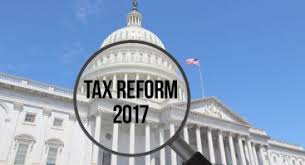
The re-hauling of the U.S. tax rates by President Donald Trump would cost about $5 billion in earnings hit for Goldman Sachs Group Inc. The lender said that the hit would take place in the fourth quarter.
This is the first time that a major U.S. bank has provided any details of the one-time impact of the new tax laws on corporate profits held overseas.
For large U.S. based companies such as Goldman that also does business globally, there has been announced and expected short term hits but long-term profits from the tax reforms that were turned into laws last week by t e Trump administration and is set to tale effect from Monday.
Billions of dollars have been stacked away in foreign banks and countries by Goldman many like minded companies. Another U.S. law had prompted such corporates to stack profits in foreign countries which states that the companies can do so as long as those profits are not brought into the U.S. and in this manner, the corporates avoided the present 35-percent U.S. corporate tax rate.
The new law slaps a tax of 8 percent on illiquid assets or a tax rate of 15.5 percent on cash and liquid assets would be imposed on such profits in foreign countries irrespective of the fact that such profits are brought back to the U.S. or not. The government hopes that this would encourage corporates to bring back the wealth to the U.S.
In recent years, approximately $2.8 trillion of profits have been stacked away overseas by a large number of multinational companies that includes the likes of Citigroup and JPMorgan Chase & Co. The Joint Committee on Taxation (JCT), a nonpartisan research arm of the U.S. Congress, estimates that about $339 billion in federal revenues would be able to be raised by the one-time tax on those earnings in the next decade.
Despite the fact that multinationals would also get 8 years to pay up the taxes, it would certainly pinch the business houses. The new law also seeks to reduce of cancel some other tax breaks for banks. Those include halts on deducting premiums paid to the Federal Deposit Insurance Corp and limits on deducting interest.
During the 2007-2009 financial crisis, hits due to deferred taxes from losses have been disclosed by some U.S. financial companies.
The Bank of America has given an account of how it would be hit by a $3 billion charge on its fourth-quarter profit. On the other hand, details of a $20 billion charge to earnings for this has been identified by Citigroup.
But analysts say that a number of other changes under the law would essentially more than offset these one-time losses by the long-term benefits.
The deep cut of the U.S. corporate taxes from the current 35 percent to 21 percent would be one tax change that would benefit the multinational companies significantly in their profit bookings in the long-term. A JCT research estimates that this high rate of tax cuts would cost the U.S. coffers more than $1.3 trillion over the next decade.
(Source:www.reuters.com)
This is the first time that a major U.S. bank has provided any details of the one-time impact of the new tax laws on corporate profits held overseas.
For large U.S. based companies such as Goldman that also does business globally, there has been announced and expected short term hits but long-term profits from the tax reforms that were turned into laws last week by t e Trump administration and is set to tale effect from Monday.
Billions of dollars have been stacked away in foreign banks and countries by Goldman many like minded companies. Another U.S. law had prompted such corporates to stack profits in foreign countries which states that the companies can do so as long as those profits are not brought into the U.S. and in this manner, the corporates avoided the present 35-percent U.S. corporate tax rate.
The new law slaps a tax of 8 percent on illiquid assets or a tax rate of 15.5 percent on cash and liquid assets would be imposed on such profits in foreign countries irrespective of the fact that such profits are brought back to the U.S. or not. The government hopes that this would encourage corporates to bring back the wealth to the U.S.
In recent years, approximately $2.8 trillion of profits have been stacked away overseas by a large number of multinational companies that includes the likes of Citigroup and JPMorgan Chase & Co. The Joint Committee on Taxation (JCT), a nonpartisan research arm of the U.S. Congress, estimates that about $339 billion in federal revenues would be able to be raised by the one-time tax on those earnings in the next decade.
Despite the fact that multinationals would also get 8 years to pay up the taxes, it would certainly pinch the business houses. The new law also seeks to reduce of cancel some other tax breaks for banks. Those include halts on deducting premiums paid to the Federal Deposit Insurance Corp and limits on deducting interest.
During the 2007-2009 financial crisis, hits due to deferred taxes from losses have been disclosed by some U.S. financial companies.
The Bank of America has given an account of how it would be hit by a $3 billion charge on its fourth-quarter profit. On the other hand, details of a $20 billion charge to earnings for this has been identified by Citigroup.
But analysts say that a number of other changes under the law would essentially more than offset these one-time losses by the long-term benefits.
The deep cut of the U.S. corporate taxes from the current 35 percent to 21 percent would be one tax change that would benefit the multinational companies significantly in their profit bookings in the long-term. A JCT research estimates that this high rate of tax cuts would cost the U.S. coffers more than $1.3 trillion over the next decade.
(Source:www.reuters.com)














